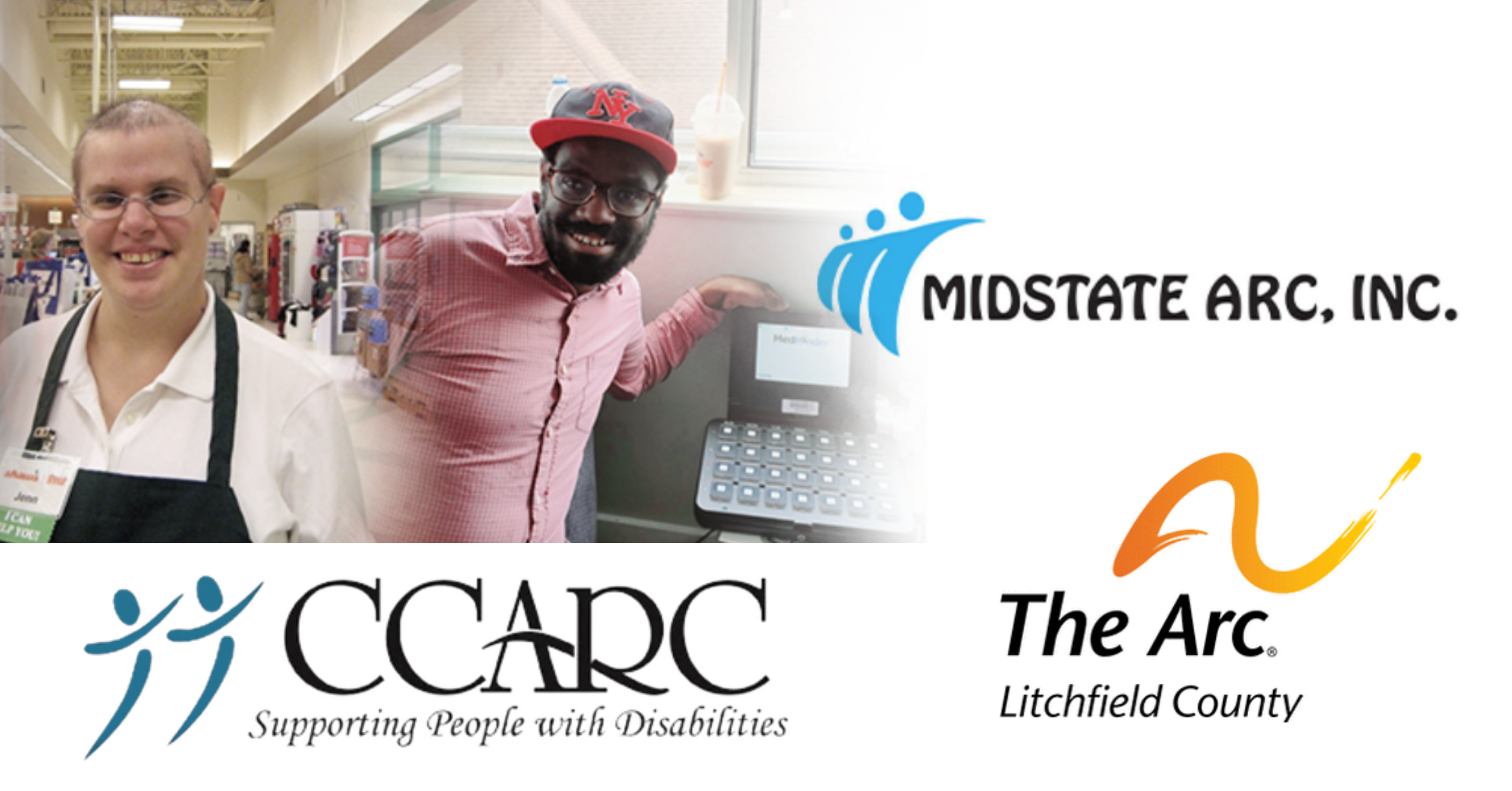In December 2022, three Connecticut-based Arc organizations embarked on a journey together to implement trauma-informed care (TIC) – not just with clinicians, not just a one-time training – but each as a whole organization aspiring to embed TIC into the fabric of their culture.
This was no small thing. It was the back-end of the pandemic, all still had many open positions, the needs of people they supported post-COVID were vast – AND they were considering joining an 18-month initiative aimed at systems change. How could they justify taking this on?
The answer coalesced around three visionary CEOs that recognized the critical part that trauma – including the trauma of COVID – played in the lives of people with IDD. They saw the transformative impact of TIC in other sectors, such as behavioral health. They knew that there would never be a “good time” to launch an ambitious initiative like this. They trusted the guidance of the Traumatic Stress Institute to lead them step-by-step on the journey.
These three CEOs took the risk of committing the financial and human resources to this change effort and are now reaping the rewards:
Michael Menard, CEO Pam Fields, CEO Linda Iovanna, CEO
The Arc of Litchfield County, Inc MidState Arc, Inc CCARC, Inc
TIC Whole-System Change Learning Collaborative
The three Arc agencies are working together in a Learning Collaborative (LC) to implement TSI’s Whole-System Change Model to TIC. They have shared trainings, participate in coaching calls together, learn from each other, and hold each other accountable. Each organization formed a Trauma-Informed Care Task Force to lead the initiative at their agency.

Kick-Off: Risking Connection Trauma Training
Representatives of all three agencies attended the 2-Day, Risking Connection (RC) IDD Basic Trauma Training, one of the only nationally-available trauma 101 training models specifically for the IDD sector.

A cross-section of staff –from CEOs to DSPs to support staff – attended this kick-off event, which provides a common framework and language for staff to understand trauma's impact and a “trauma lens” to view current practices and procedures. Next, some staff were selected to become RC Trainers and RC Champions and attended a 2-Day RC IDD Train-the-Trainer in order to become effective teachers of the RC IDD Basic training within their agencies. The goal is that eventually all staff at each agency will receive the RC IDD Basic Training, and that it will become a standard training for new staff going forward.
Next Steps
When RC Trainers and Champions returned to their agencies, they were fired up and motivated to create a buzz about what they had learned in the RC IDD Basic Training. They each took different approaches. MidState Arc created posters about R.I.C.H relationships; that is, relationships that embody Respect, Information, Connection, and Hope.


The organizations uplifted and celebrated their Trauma-Informed Care Task Force members, RC Trainers, and Champions as leaders on trauma-informed care within the organization. CCARC created a bulletin board to ensure staff know who's on the Task Force, including a RICH graphic of their own.
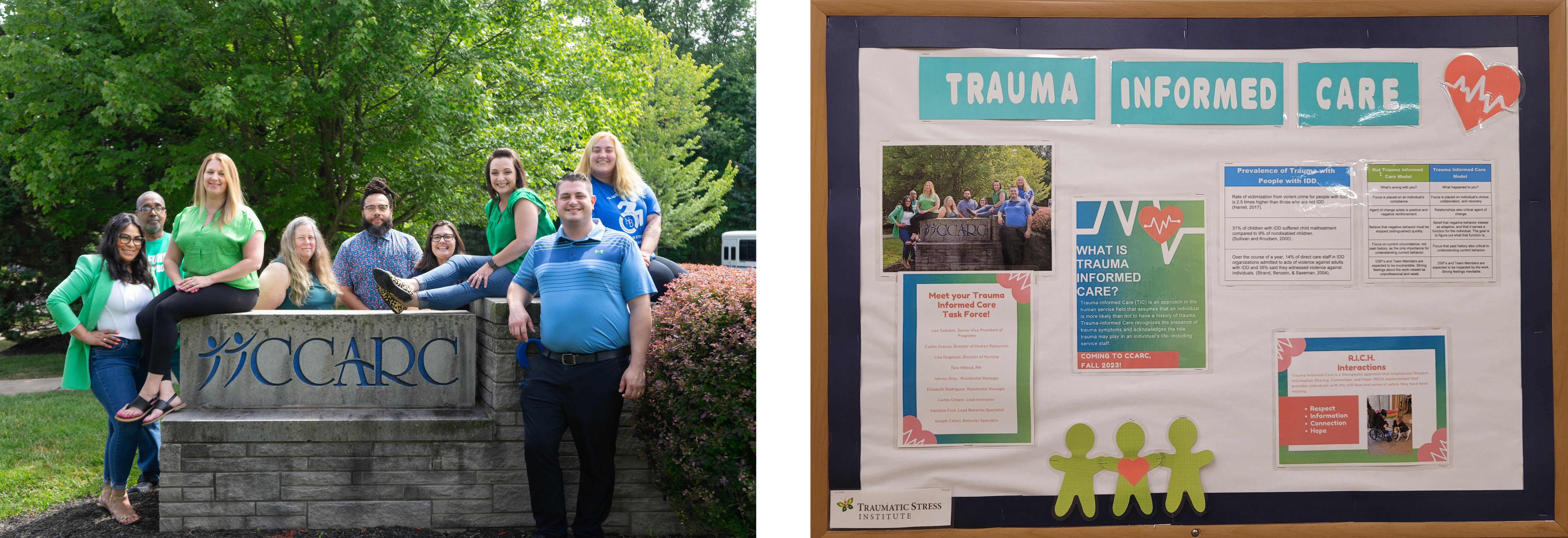
Implementation Planning and Coaching

Next, each organization created a TIC Implementation Plan tailored to their organization. The plans detailed how they will roll out Risking Connection training to their organization, policy changes they plan to make, and other interventions to spread and promote trauma-informed thinking.
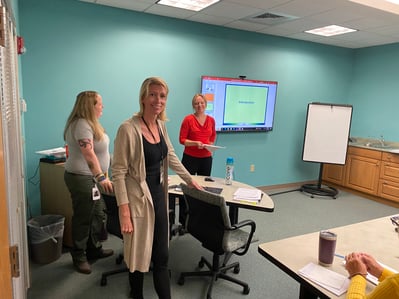
The Arc of Litchfield County jumped in immediately to roll out Risking Connection Basic training to program staff using their newly-trained RC Trainers, pictured at left.
Representatives from each organization's Task Force met monthly in Learning Collaborative meetings to share progress on their implementation plans. By this point in the initiative, they knew each other well and felt safe sharing their triumphs and struggles. TSI Faculty shared lessons they've learned working with other organizations going through the same process.
The Generative Process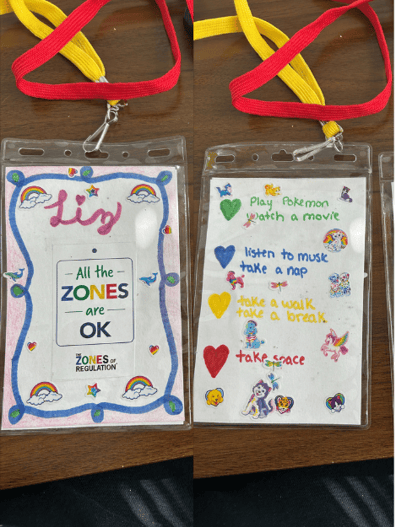 As implementation proceeded, more ideas were generated.
As implementation proceeded, more ideas were generated.
TIC and Risking Connection Basic training stresses the critical importance of building feelings management skills in both the people supported and in staff, as well.
When people learn the skills to calm themselves when having big feelings, they don’t need extreme behaviors to meet their needs.
Staff at CCARC created laminated badges to wear around their necks displaying for all to see the strategies THEY use to calm themselves when activated. At the same time, they are teaching these skills to people being supported while modeling it themselves.

Mid States ran with the idea of fostering RICH relationships from the Risking Connection training. They created a friendly competition between group homes where each could earn points when the residents attended community events – a positive point system. This connected residents to each other and the community and bonded the homes to each other socially. To the left is a list of the events and points earned for each event.
Program Evaluation
At three different time points during the 18-month initiative, the organizations administer the Attitudes Related to Trauma-Informed Care (ARTIC) Scale via an online platform. In this way, they can see whether staff attitudes about TIC are improving over time because of the initiative. The organizations receive a report on a dashboard with their results and individual staff that take the measure received confidential individual reports about their progress. Here’s a look at a graph on a sample Online ARTIC Report.
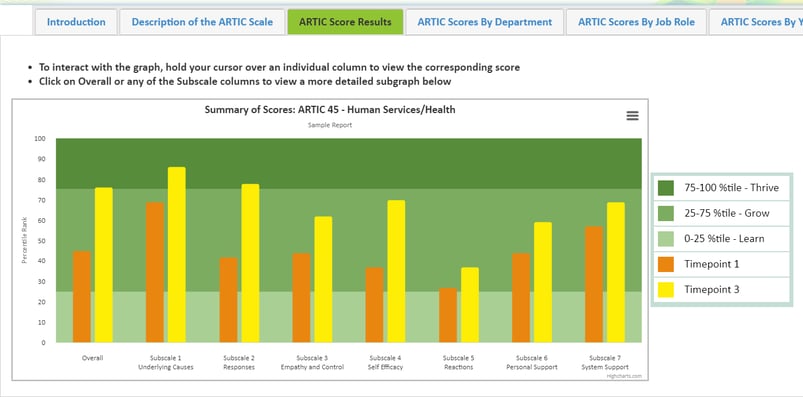
The Adventure Continues
Thanks to Litchfield Arc, MidState Arc, and CCARC for giving us permission to share part of their experience for the benefit of others. It has been so heartening to see each agency engage fully in the trauma-informed journey and we have every confidence they will continue to dig into the work that needs to be done to create lasting, positive change in their programs – for the benefit of both their clients and their staff. We look forward to seeing how each will continue to respond to new twists and turns.

